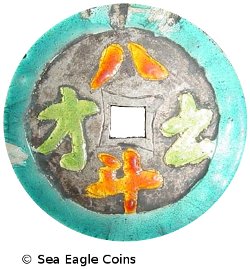Cao Cao (曹操, 155-220 AD) was a warlord and a major historical figure of the Three Kingdoms period of ancient China.
Cao Cao had two sons. Both Cao Pi (曹丕) and Cao Zhi (曹植) were very intelligent but the younger Cao Zhi was exceptionally gifted.

At the left is a handmade charm dating from the Qing (Ch’ing) Dynasty (1644-1911). The inscription ba dou zhi cai (八斗之才) translates as “eight decalitres of talent”, or “eight bushels of talent”, and is based on a story involving the brothers Cao Pi and Cao Zhi.
Upon Cao Cao’s death, the elder son Cao Pi ascended the throne.
Unfortunately, Cao Pi was jealous of his younger brother’s talents and feared that he might cause problems.
In fact, Cao Pi was so mean-spirited that he devised a plan to kill his brother.
One day Cao Pi challenged his brother to compose a poem in less time than it would take for him to walk seven steps.
If he failed, he would be killed.
Cao Zhi asked his brother what the subject of the poem should be. Cao Pi replied that it must be “about brothers” but that the verse could not contain the word “brother”.
In deep contemplation, Cao Zhi began to walk but before he took the seventh step he stopped and recited the following verse which is now known as “The Seven Step Poem”: 煮豆燃豆萁,豆在釜中泣.本是同根生,相煎何太急.
People burn the beanstalk to boil beans,
The beans in the pot cry out,
We are born of the self same root,
Why should you torment me so much?
The implied meaning of the verse is “we are brothers of the same family so why should one oppress the other?”
Cao Zhi met his brother’s challenge and would continue to write many outstanding works during his lifetime.
Xie Lingyun (谢灵运, 385-433 AD), a famous poet of the Eastern Jin Dynasty, would later write: 天下才有一石(十斗),曹子建(曹植)独占八斗.
Heaven only gave the world ten dou in a dan* and Cao Zhi alone has eight of them.
Since that time, the expression “eight decalitres of talent” (cai gao ba dou 才高八斗), or “eight bushels of talent”, has referred to a person who is very gifted and has a great talent for writing.
* The dan (石) was the ancient Chinese measure for grain. One dan consisted of ten dou (斗). A more accurate translation would be “Cao Zhi had 8 dou of a total 10 dou (one dan) of the world’s talent”. The idiom, however, is usually translated into English using either the metric measure “eight decalitres (10 litres) of talent” or the British/American measure “eight bushels of talent”.
You are a very capable individual!
Thank you for your wonderful site and all your hard work and for sharing your passion